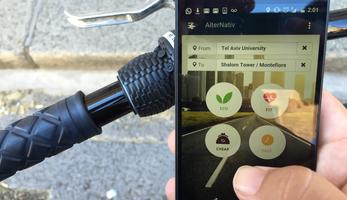The effectiveness of non-financial incentives in promoting the use of sustainable transport modes
Thematic areas
Summary
As part of the actions related to its SUMP, the Municipality of Tel Aviv-Yafo explored the efficacy of non-financial incentives in promoting behavioural change that would lead to sustainable mobility.
Implementing sustainable mobility
Achieving behavioural change in general and changing traveling habits in particular is always a challenging mission. The main objective of this measure was to explore the potential of non-financial incentives in promoting the sought for behavioural change.
Progress
A group consisting mainly of students at Tel Aviv University was asked to take part in an experiment and to complete a preliminary questionnaire regarding the students’ travel habits. A dedicated Facebook group was formed, serving as a platform for posting and commenting on transport-related information, featuring mainly information for promoting sustainable modes of transport. The group’s participants were encouraged to use AlterNative, a journey planner that enables selection of a transport mode based on emission savings and calorie consumption, as well as duration and cost of the journey.
During a three month period, the participant’s activities in the FB group and their mobility behaviour recorded by AlterNativ were analysed. Based on conclusions drawn, new content was posted within the Facebook group almost on a daily basis.
An algorithm for identifying the transport modes used by the participants for each section of the journey, based on GPS data recorded by AlterNativ, served as the basis for analysing actual mobility patterns.
Outcomes
Although, 13-week long experiment is not enough time to achieve sustainable change in travel behaviour analysis of the results indicated that social incentives have the potential to promote the use of sustainable transport modes.
More than 80% of the participants chose to remain exposed to the content posted by the FB group and 25% of the participants continued using AlterNativ for the entire 13 weeks despite associated issues, such as, revealing one’s route and transport mode and battery consumption.
The analytical tools developed for monitoring participants’ behavioural patterns provided a promising foundation for future design and implementation of measures to promote the use of sustainable travel modes and enabled determining guidelines for carrying out similar measures in the future:
· A FB group is an appropriate arena for disseminating information concerning sustainable transport. However, cooperating with existing social networks, such as those of residents of the same neighbourhood or parents to children at the same school, might be more effective, especially as travellers are more interested in transport information concerning their specific needs and travelling habits rather than general information.
· Contests concerning the use of specific sustainable transport modes, even when no financial incentives are offered to the winners, are an effective tool. The frequency and duration of such contests so that they maintain their effectiveness still needs to be explored.
· It is possible to obtain the actual route and transport modes based on geo-monitoring of the travellers journeys. This ability holds great potential for understanding travellers’ revealed preferences and planning transport services to meet their needs. Proper incentives to encourage travellers to allow the monitoring of their journeys is still a challenge.







